THE Oslo City Hall was filled with the most influential people in Norway – royalty, politicians, corporate figures and the like. They were all gathered to witness a historic ceremony that has honoured some of the most influential people in history, including Mother Teresa, Martin Luther King, Jr., Aung San Suu Kyi, Nelsen Mandela, Barack Obama and, most recently, Malala Yousafzai.
And somewhere in that same audience, were two young Malaysian women.
It was the 2015 Nobel Peace Prize ceremony, an event first held over a hundred years ago to honour some of the most momentous achievements in human history.
The magnitude of the experience was not lost on those two young Malaysians (and a certain R.AGE editor) in the audience.
Heidy Quah and Adley Chan were there as delegates to the Telenor Youth Forum (TYF), where some of the world’s brightest young minds gather every year to generate and share ideas to make the world a better place with technology.
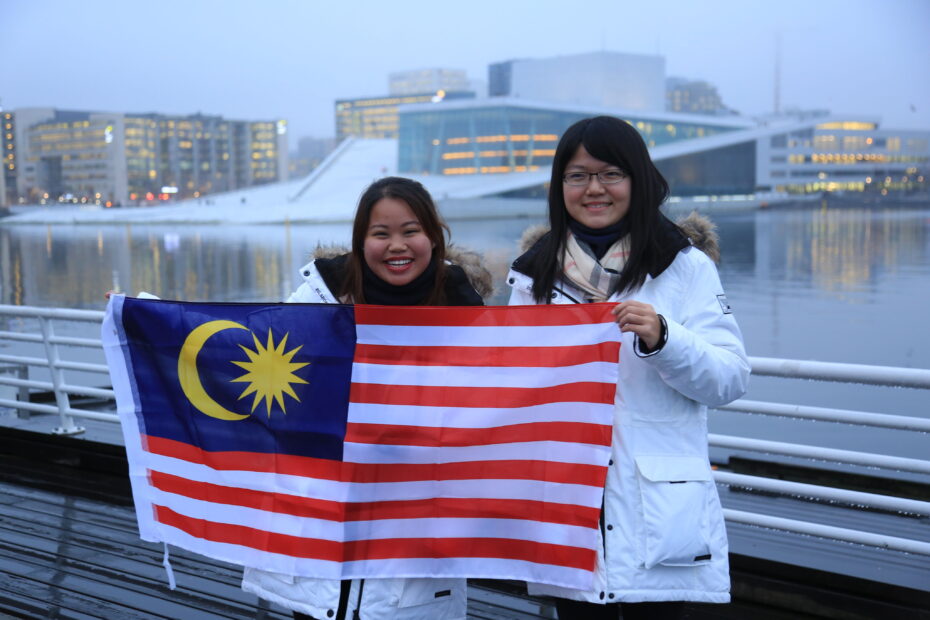
Heidy Quah and Adley Chan attended the Nobel Peace Prize ceremony as Malaysian delegates to the Telenor Youth Forum.
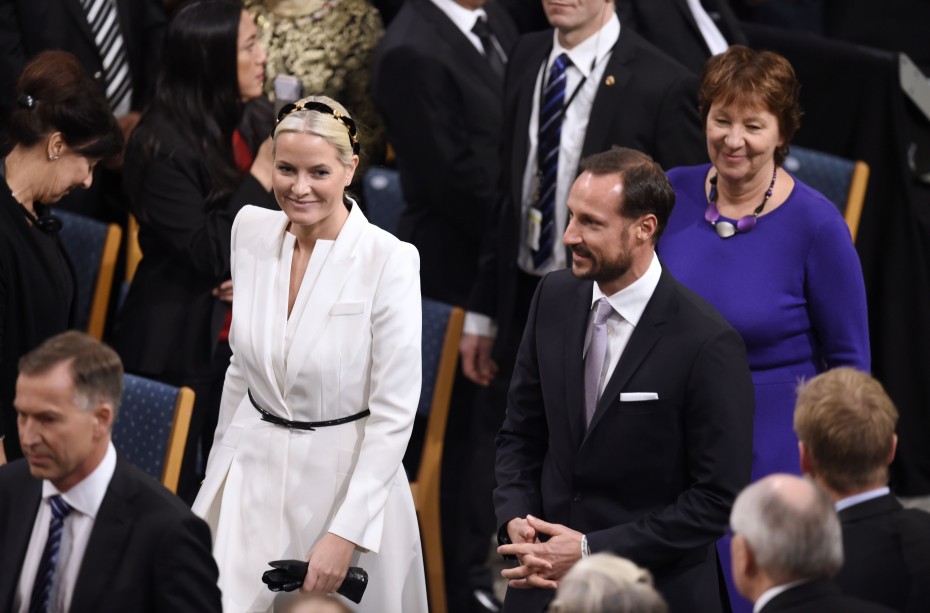
The Nobel Peace Prize is attended by some of the most influential people in Norway, like Prince Haakon and his wife Crown Princess Mette-Marit pictured here. And then there was us and the kids from the Telenor Youth Forum.
— AFP
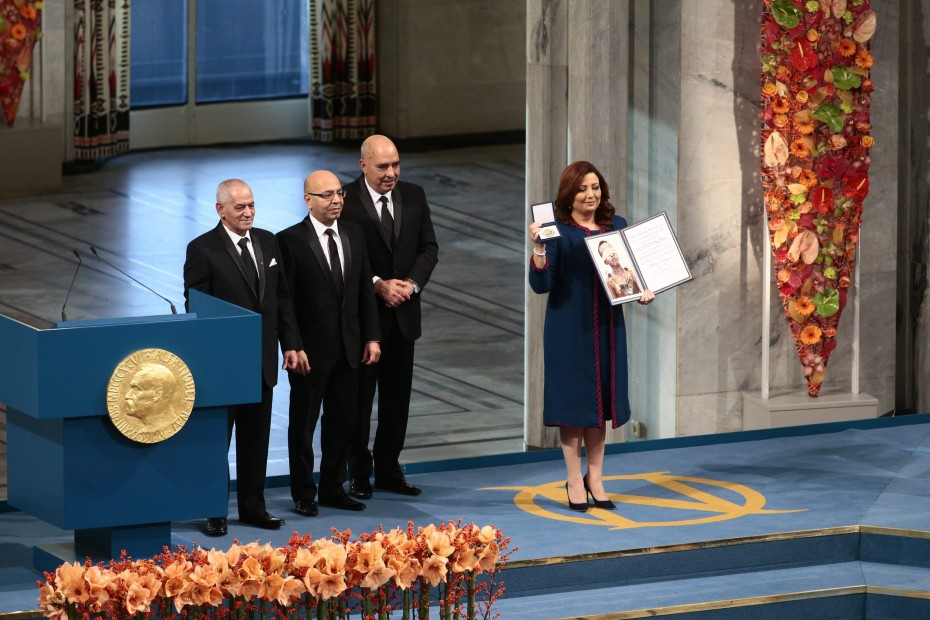
The 2015 Nobel Peace Prize laureates, the Tunisian National Dialogue Quartet (L-R): Hassine Abassi, President of the Tunisian Order of Lawyers, Mohamed Fadhel Mahfoudh, Abdessattar Ben Moussa and Ouided Bouchamaoui. The Quartet helped establish a pluralistic democracy in Tunisia in the face of civil war.
— Reuters
The Telenor Group (which organises TYF), a global telecommunications giant based in Norway, is a sponsor of the Nobel Peace Prize, which is how a bunch of young TYF kids were able to score invites to one of the most prestigious events in the world.
There, they witnessed another historic moment. The Tunisian National Dialogue Quartet were the 2015 laureates after their remarkable efforts in sparking a democratic revolution in Tunisia.
They had dragged the country back from the brink of civil war, all through the power of – believe it or not – dialogue.
“It was so emotional,” said Quah, 21, who beat out a host of other brilliant young Malaysians to be selected as a delegate by Digi, which is part of the Telenor Group.
“(The Quartet) went through so much for their country – they fought the good fight, and came out victorious.”
Quah is the founder of Refuge For The Refugees, a non-profit organisation providing holistic education to refugee children in Malaysia.
“It was always a dream of mine to win a Nobel Peace Prize. I know it’s a very far-fetched thing, but now I’m here, it kinda feels like… who knows?”

The 2015 Telenor Youth Forum delegates were brought together from all over the world to discuss ideas to improve education through digital technology – and they got to attend the Nobel Peace Prize as well. — KILLIAN MUNCH/Telenor
Saving a nation
(The new Tunisian constitution) is the most egalitarian and democratic constitution in the Arab world”
– Kaci Fullman Five, Norwegian Nobel Committee chairman
Given a choice, most people would probably have chosen to attend last year’s ceremony, ‘cos that was the year of Malala.
And to be honest, even we had never heard of the Tunisian National Dialogue Quartet, which sounds more like the choral speaking version of Il Divo.
But by the end of the ceremony, we were stunned by what they had accomplished in their country.
It all started in 2010, when Tunisian fruit seller Mohamed Bouazizi publicly set himself on fire in a desperate act of protest against the widespread corruption which had plagued his small business.
His story swept through the region, sparking the protests and revolutions which we now know as the Arab Spring.
The initial wave of optimism was felt throughout the world as several regimes were toppled (including that of then-Tunisian president Zine El Abidine Ben Ali), but the continuing struggles of the fledgling democracies? Not so much.
By early 2013, Tunisia was close to civil war, as the transitional parliament led by Ennahda, an Islamist political party, was accused of appointing loyalists to government posts. It also attempted to push through a religious constitution which (among other things) stipulated that women were “complementary” – not equal – to men.
Things then got really ugly. Two vocal critics of Ennahda were murdered, one brutally gunned down in front of his wife and daughter.
That’s when Hassine Abassi, secretary general of the influential Tunisian General Labour Union, knew something had to change.
He brought together three other leaders of important organisations – Mohamed Fadhel Mahfoudh, president of the Tunisian Order of Lawyers, Abdessatar Ben Moussa, president of the Tunisian Human Rights League and Ouided Bouchamaoui, president of the Tunisian Confederation of Industry, Trade and Handicrafts.
As leaders of civil society organisations, they had no right to make demands of the government. What they could do as skilled negotiators, however, was bring everyone together to talk about a solution, which is how they came to be known as the Tunisian National Dialogue Quartet.
The solution they recommended was a road map – the sitting three-party government would relinquish power, a non-partisan interim government would be installed until elections could be held, and a democratic constitution which took into account the opposition’s concerns would be passed.
Remarkably, the Quartet was able to talk all three parties in the government into stepping down after a long and complicated negotiation process.
In Jan 2014, Tunisia’s new constitution was adopted. According to Kaci Fullman Five, chairman of the Norwegian Nobel Committee, it is “the most egalitarian and democratic constitution in the Arab world”.
Then came the biggest victory of all. On Oct 26, 2014, the elections were held according to plan, and the interim government and president resigned, as planned, to make way for democratically elected representatives.

One of the members of the Quartet, Hassine Abassi, Secretary General of the Tunisian General Labour Union, holding up the Nobel Peace Prize ‘diploma’ and medal to huge applause.
— Reuters

Members of the Quartet took turns delivering their ‘Nobel lecture’, where they paid tribute to the women and youth of Tunisia, who “revolted against discrimination and exclusion”. Pictured here is Ouided, delivering her portion of the lecture.
What’s next for Tunisia
As the Quartet received their “Nobel diploma”, on the same stage where Malala, Obama, Mandela and Co. once stood, the entire Oslo City Hall rose as one to applaud them.
But even as they accepted the honour, they were looking ahead to the challenges that continue to face Tunisia and, indeed, the rest of the world.
They spoke about tackling the threat of terrorism, something which Tunisians know all too well after the attack last year at Port El Kantaoui, which saw a gunman massacring 38 tourists.
They also spoke about the role of youth in the revolution, and paid tribute to the women of Tunisia.
To round up the ceremony, Tunisian singer-songwriter Emel Mathlouthi gave a hauntingly beautiful performance of her protest song, Kelmti Horra (My Word Is Free). Even though most of the audience couldn’t understand the lyrics, the tone and delivery had many in tears.
It was almost a perfect representation of the Tunisian revolution – a young, empowered woman singing a folk-inspired tune, backed by a single dreadlocked, Gibson Les Paul-wielding guitarist. She seemed the embodiment of her ancient civilisation’s defiant embracing of a modern, pluralistic democracy, all in the face of hatred and violence.

The crowd gave the Quartet a rousing ovation as they left the ceremony. You can see Hassine here celebrating with Berit Reiss-Andersen, member of the Norwegian Nobel Committee, as they left.
— AFP
And yet, the incredible achievements of the Tunisian people have gone relatively unnoticed.
Chan, 20, admitted she had never heard of the Quartet, but she won’t be forgetting them anytime soon.
“I really love the spirit of the Tunisian people, and how they united for a common goal. It’s something we could really do with more of here in Malaysia,” she said.
“Being at the ceremony makes you imagine what it would be like to change the world. You can see how much it means to them and the people of Tunisia.”
Indeed, it was the kind of event that could inspire a generation.
Later that night, the TYF delegates joined the annual Nobel Peace Prize torch parade, where the people of Oslo, young and old, gathered to march to the Grand Hotel with torches in their hands, a symbol of the city’s solidarity with all who strive for peace.
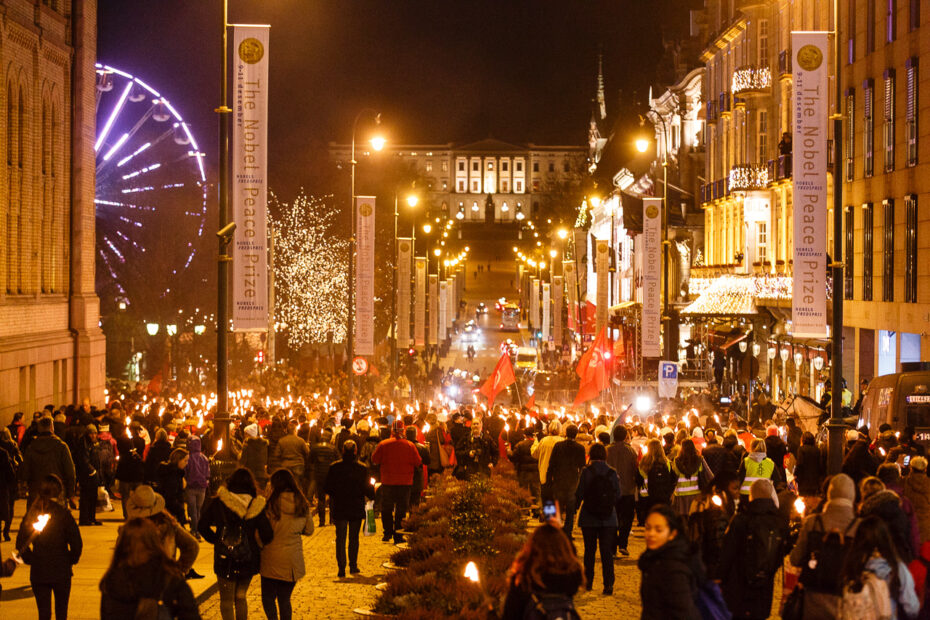
The annual Nobel Peace Prize torch parade, where the people of Oslo march toward the Grand Hotel as a show of support for all who strive for peace. — KILIAN MUNCH/Telenor

The Quartet waving to the crowd from the Grand Hotel’s iconic balcony, where so many Nobel Peace Prize laureates have stood before. Tunisians started singing their national anthem as the Quartet came out. — KILIAN MUNCH/Telenor
Tunisians singing in Oslo last night, during the annual torch lighting ceremony for the Nobel Peace Prize laureate. pic.twitter.com/TxNiyacmh8
— R.AGE (@thestar_rage) December 11, 2015
The laureates are then presented to the public from the hotel’s now-iconic balcony. As the Quartet made their appearance, the people flashed peace signs, waved Tunisian flags, and some sang the Tunisian national anthem as the square in front of the hotel was lit up with thousands of torches.
It brought to mind a quote by arguably the most popular Nobel Peace Prize laureate of all, Martin Luther King, Jr., one which was quoted to great effect at the ceremony:
Darkness cannot drive out darkness; only light can. Hate cannot drive out hate; only love can.”

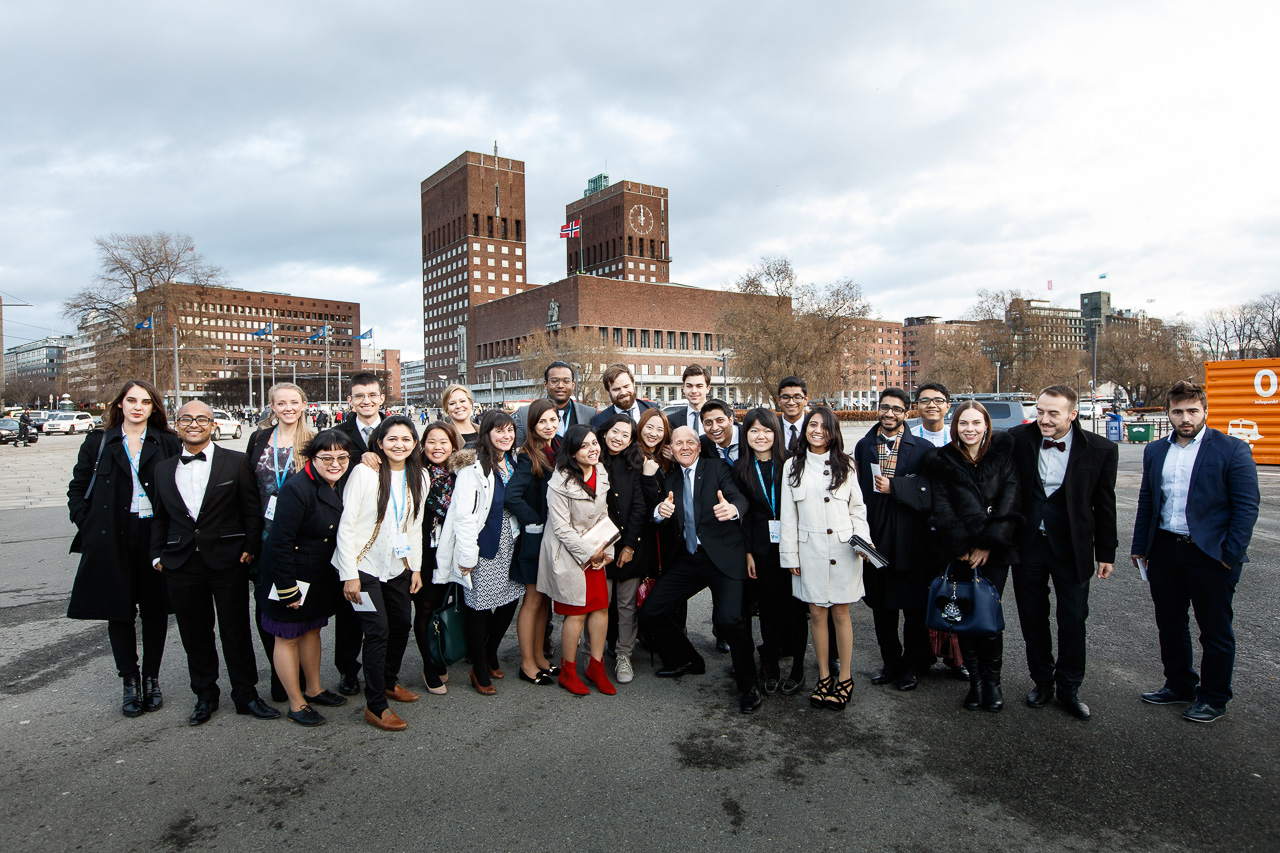
Leave a reply